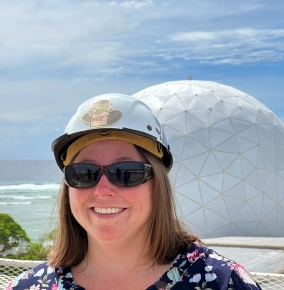Sarah Willis

What kinds of program activities are you engaged with on Kwajalein?
My daily routine is a balance of technical work and analysis and collaboration with our government sponsors and other range contractors. My work touches on most aspects of the Laboratory's activities on Kwajalein. I have been in the roles of our on-site lead for ALCOR [ARPA-Lincoln C-Band Observables Radar] and Millimeter-Wave Radar, our two imaging radars, and ALTAIR [ARPA Long-Range Tracking and Instrumentation Radar], which is the deep-space workhorse. I am also involved in work on our optics sensors and telemetry systems. The unifying theme of all my projects is helping to make upgrades and improvements to keep the range relevant for future customers. Every day on Kwajalein, we are faced with new challenges in a resource-constrained environment, where we have to innovate and draw on the expertise of a diverse team to successfully execute our common mission.
Are you involved in any of the educational outreach programs that the Laboratory runs for students on Kwajalein?
I lead the local Beaver Works Summer Institute on Kwajalein, which offers hands-on project-based STEM activities – for example, programming code, developing algorithms, and using software to teach mini remote-controlled vehicles how to navigate, map, and detect objects — for high school students residing on Kwajalein and from the neighboring island of Ebeye. I also run astronomy outreach activities, including our popular community astronomy nights, public science talks on the beach, and classroom visits. Because of various socioeconomic factors, many local students have extremely limited access to STEM activities at school. The Marshall Islands, where the land only rises a few feet above sea level, are facing existential threats due to climate change and have an urgent need for local students to become scientists and engineers to innovate and lead engineering solutions to help their communities adapt. Our STEM outreach programs help students learn about potential STEM careers and what they can achieve for themselves and their communities.
Besides Kwajalein, where have you traveled or would like to travel?
I spent a summer abroad in Japan during high school and a summer abroad in India as a grad student. I have been to Chile to observe at the Cerro Tololo International Observatory and across Europe for various astronomy conferences. One of my favorite trips was to Iceland, conveniently timed for when the aurora was extremely active. Since coming to Kwajalein, I have only been to New Zealand, but I have many sites across Southeast Asia and Australia on my travel bucket list. I would also like to travel to some of the other island nations across the Pacific, including Kosrae, Pohnpei, and Chuuk.
What led you to choose your field of study?
I have always been interested in space. I studied astrophysics because I wanted to learn more about where we might find life elsewhere in the universe or where humanity might be able to thrive when we someday make it off Earth.